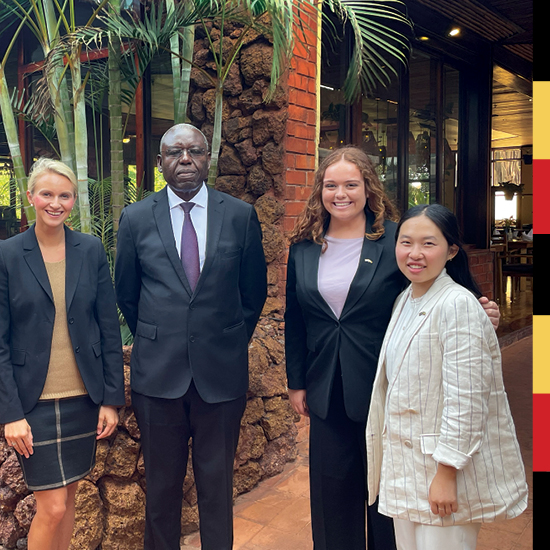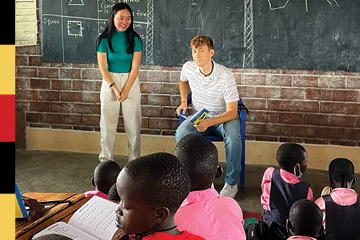A Study in Context
Far from home, Seaver College students experience life in a different context through a new pilot program in Uganda
In June of this year, 20 Seaver College students departed Malibu for Kampala, Uganda,
to join faculty members and Caruso School of Law students working with the Sudreau
Global Justice Institute (SGJI) for a pilot program that would initiate opportunities
for Pepperdine to expand its international footprint.
Pepperdine’s presence in Africa has long been a highlight of the University’s global experience offerings. SGJI, continuing the nearly two-decades-long work of president Jim Gash (JD ’93) and vice president Danny DeWalt in Uganda, has made a deep and transformative impact on access to justice and criminal justice reforms in the country by providing critical legal resources for imprisoned individuals awaiting due process and has shaped its justice system in tremendous ways. Made in the Streets, a local partner program in Kenya, sends Seaver College biology students, alongside faculty, to provide education, vocational classes, and sustainable living practices to the underserved children of the city of Kamulu through relationships, academic learning, and hands-on training each year.
Unlike many service and educational opportunities in developing countries, this pilot program emphasized how Ugandans support themselves and the different ways they care for each other by immersing students in the vast landscape of Ugandan life. Traveling to government operations and NGOs as well as churches and schools, students walked alongside the Ugandan people, learned about their history and religions, and observed the ways in which their own lives in the United States both aligned with and differed from that of the Ugandans.
The program began in Malibu, where students spent two weeks steeped in two courses
that would prepare them for their journey. The first, Faith and Advocacy, taught by
the program’s codirector, former dean of international programs Charles Hall, introduced
students to the practice of evaluating their lives and circumstances in relation to
the circumstances they may face in a different context or setting. The second, Practicing
Incarnation: Uganda, examined the role of Christianity in Ugandans’ response to recent
conflict and its aftermath and emphasized the incarnation of Jesus as a model for
advocacy. Taught by the program’s other codirector, Ron Cox (MDiv ’96), interim dean
of international programs and Seaver College professor of religion, the lesson plan
also explored the ways in which these social aspects influence Christian life and
faith in Uganda.

Students stand with members of the Ugandan government at a leadership conference.
Less than a week after students arrived in Kampala, they traveled to Gulu to meet with President Gash, Vice President DeWalt, Caruso Law students, and American and Ugandan lawyers participating in SGJI programming. The next day, the students found themselves in Gulu Main Prison, where they observed the work being done by SGJI to help the imprisoned individuals understand whether their various cases were eligible for immediate access to justice. Alongside Caruso Law students, Seaver students evaluated cases and learned Uganda’s complex judicial process that had prevented incarcerated Ugandans from accessing justice for generations.
At the prison, Seaver first-year Faith Chang understood the significance of context and the lessons she learned in Cox’s class as she surrendered her cell phone and entered the guarded facility. In close quarters, Chang, along with Ugandan and US lawyers, Ugandan and Caruso Law students, and prison guards sat with people accused of crimes ranging from minor to heinous.
Despite her assumption that the prison would be a place of despair and devastation, Chang instead found glimpses of peace, hope, and even joy and was grateful that the Ugandans allowed her and her fellow students to be part of a deeply vulnerable passage in their lives.
“For the most part,” she says, “despite their situation and the crimes they committed,
there wasn’t an attitude of bitterness, but hope and responsibility. That speaks greatly
to the character of their culture and their people and their resilience and sense
of justice in its truest form.”
Emma Rydholm, a transfer student who had been considering pursuing law school after her undergraduate studies, described the experience as a test and reinforcement of her faith and confirmation of her career calling.
“These people had committed the most atrocious crimes, and we were supposed to fight for their rights?” she recalls wondering. “I believed they didn’t deserve us. I believed they didn’t deserve the lesser sentence we were there to get them. But Jesus died to forgive me of my sins, and Jesus died for them too. Who was I to think they had committed sins worse than I had? Who was I to think I deserved Jesus more than they did or that they were past the point of God’s redemptive powers? If I claimed to love God and his people, that meant loving the prisoners on remand just as much as the friends and professors beside me.”
Still reeling from the poignant experience the next day, students and faculty were
scheduled to visit Restore Leadership Academy, a secondary school in Gulu, Uganda,
founded by Bob Goff, whose students were previously child soldiers, rescued from lives
of forced sex trafficking, orphans, or from backgrounds of extreme poverty.
You truly find YOURSELF and become yourself
MORE through these experiences.
It AWAKENS things in students they don’t know are there.
— Ron Cox (MDiv ’96)

Students visit the primary school at Restore Leadership Academy in Gulu, Uganda.
“Our students dealt with distressing criminal cases on Thursday and encountered these
beautiful and active young minds on Friday,” says Cox. “They were confronted with
not only the differences between life in the US and life in Uganda but also the commonality
of humanity. The International Programs office often uses the language of transformation,
but we can also use the language of discovery or self-discovery. You truly find yourself
and become yourself more through these experiences. It awakens things in students
they don’t know are there.”
Beyond an opportunity to supplement Pepperdine’s international programs, University leadership was clear about involving students in the development and advancement of such experiences where they may engage in and be a part of world solutions. Traveling abroad, discovering the joy of learning a new culture, and engaging with that culture in the emerging world has been a significant driver of DeWalt’s life’s investment and calling.
DeWalt, who serves as the executive director of the SGJI in addition to his roles as vice president and chief of staff, has visited Uganda nearly 30 times himself in the last 16 years. He shares that people who have traveled to the emerging world typically experience a sense of purpose when invited to partner with other countries to support their needs and help them develop their own ability to overcome the challenges they face. He holds closely the practice of training and equipping the people of Uganda with humility to learn from them and collaborate on tangible solutions.
“We are not trying to rescue people or save the day,” he continues. “We walk alongside them and walk that path with them, building friendships around the world and seeing humanity thrive with justice as the foundation.”
As Pepperdine considers its position as a top national university, University leadership continues to prioritize providing students with powerful service opportunities and global experiences that will give them new perspectives and insights into their life’s purpose.
“This provides a broader, deeper, and richer experience than the classroom alone,” says DeWalt. “This work connects to our faith, connects us to serving our world, and connects us with leadership around the world to discover even more opportunities to learn and serve.”
